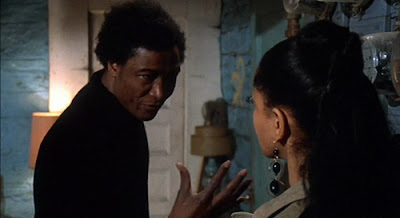That fence is nothing less than 110th Street itself, the dividing line between the lush greenery of Central Park and the urban war zone of Harlem, a demarcation explicated by a mafia don to Nick D’Salvio (Anthony Franciosa), his son-in-law, in advising of the robbery and how Nick needs to find these thieves to send a message to maintain authority. The words matter, of course, but so does the view, from some ritzy apartment overlooking the park, two men on top of the world looking down on Harlem as theirs. The apartment may as well be a castle in the sky to someone like Jim who we see later in a viscerally dingy, windowless walk-up, a gas meter for a decorative artifact, emblematic of both “Across 110th Street’s” stellar location work, making it feel as if Jim is squatting at the end of the world, and the omnipresent handheld camera, which allows for Shear to film in such tight spaces but also emphasize that tightness, underscoring the idea of how despite having scored all that cash, Jim still has nowhere to go. His girlfriend wants something more for him than a life of crime, a predictable refrain though the movie makes it count for so much more in the way he excoriates her for aspiring to something that is not theirs. “You’ve gotta get your mind out of that white women’s dream,” he intones in a biting, incredible line delivered with all the bitterness it deserves, calling out the American Dream’s discrimination.
The robbery takes place in the jurisdiction of Captain Frank Mattelli (Anthony Quinn), Italian-American and unreservedly a racist, in attitude, action, and words, even though he takes money from Harlem’s Black crime boss, Doc Johnson (Richard Ward), a suggestion money can, sometimes, cross all prejudices. It’s not Mattelli’s case though, assigned instead to African-American Lt. William Pope (Yaphet Kotto), strictly a political appointment, to make the city look good. Mattelli accepts it, if barely, encouraging his new superior to get down and dirty, pointedly asking if he’s a cop or a social worker, a striking line that seems to predict our current future (or suggest why our present is a product of and not so different from our past). Pope, though, remains adamant in wanting to solve this case and get his promotion on, as he says, his own terms. Perhaps, but Kotto lets you see how Pope seethes with his own kind of resentment that goes hand-in-hand with having to twice as dutiful and good as corrupt cohorts. Quinn, meanwhile, reduces nearly his entire performance to a virtual manifestation of physical anger and violence, like it’s what he runs on, bubbling up in almost every line, every gesture.
Such violence is omnipresent. This is a gruesome movie, though such gruesomeness is more than mere empty spectacle. When Nick is torturing Joe by dangling him from the roof of an under-construction high rise, Shear repeatedly cuts back to a pair of Nick’s African-American associates, the wordless anguish in their eyes palpable, reckoning in real time with this insidious presence they have allowed to fester in their community. Jim’s submachine gun is not just a sensation prop but a virtual extension of his character, the cacophonous spraying of bullets both at the end and the beginning a product of his being cornered, just like he is in the world itself, reduced to no other option than violent crime, transforming the hoary cinematic chestnut about going down with guns blazing into one of supreme tragedy.





No comments:
Post a Comment